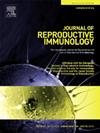Effects of anti-TNF agents on fertilization and pregnancy outcomes from a paternal perspective
IF 2.9
3区 医学
Q3 IMMUNOLOGY
引用次数: 0
Abstract
Anti-TNF drugs are effective in the treatment of inflammatory arthritis. However, concerns about the impact of anti-TNF therapy on fertility, particularly in male patients, have been insufficiently explored. This study aimed to investigate the effects of anti-TNFs on male fertility and examine the pregnancy outcomes of their partners. This study was conducted on male patients with inflammatory arthritis undergoing anti-TNF therapy. Male patients whose female partners became pregnant during the anti-TNF therapy were evaluated regarding their partners' pregnancy outcomes. The characteristics of infertile patients were also analyzed. Additional evaluations included patient age, disease duration, anti-TNF treatment duration, as well as partners' comorbid conditions and the pregnancy outcomes of their partners prior to the initiation of anti-TNF therapy. A total of 101 male patients were included in the study. Of the total cohort, 70 male patients (69.3 %) did not desire children and were using contraception. The female partners of 27 male patients successfully conceived while their partners were receiving anti-TNF therapy. The remaining 4 couples were considered infertile. There were 52 pregnancies in total. Of these, 36 resulted in term births, 1 in a preterm birth, 1 in a stillbirth, 4 in elective abortions, and 10 in spontaneous abortions. Among the 27 female partners who conceived during anti-TNF therapy, 11 had also experienced pregnancies prior to the initiation of treatment. There were no statistically significant differences between the two periods in either the number of pregnancies or pregnancy outcomes. Anti-TNF therapy appears to be safe in terms of both fertility and pregnancy outcomes, although further investigations are warranted to better clarify its impact on male reproductive health.
从父系角度看抗肿瘤坏死因子对受精和妊娠结局的影响
抗肿瘤坏死因子药物对治疗炎性关节炎有效。然而,关于抗肿瘤坏死因子治疗对生育能力的影响,特别是对男性患者的影响,还没有得到充分的探讨。这项研究旨在调查抗肿瘤生长因子对男性生育能力的影响,并检查其伴侣的怀孕结果。本研究是在接受抗tnf治疗的男性炎性关节炎患者中进行的。在抗肿瘤坏死因子治疗期间女性伴侣怀孕的男性患者对其伴侣的妊娠结局进行评估。对不孕症患者的特点进行了分析。其他评估包括患者年龄、疾病持续时间、抗tnf治疗持续时间,以及伴侣的合并症和伴侣在抗tnf治疗开始前的妊娠结局。研究共纳入101例男性患者。在整个队列中,70名男性患者(69.3% %)不想要孩子并使用避孕措施。27名男性患者的女性伴侣在接受抗肿瘤坏死因子治疗时成功怀孕。剩下的4对夫妇被认为是不育的。总共有52例怀孕。其中,36例足月分娩,1例早产,1例死产,4例选择性流产,10例自然流产。在抗肿瘤坏死因子治疗期间怀孕的27名女性伴侣中,11名在治疗开始前也有过怀孕经历。这两个时期在怀孕次数和妊娠结局上没有统计学上的显著差异。抗肿瘤坏死因子治疗在生育和妊娠结局方面似乎是安全的,尽管需要进一步的研究来更好地阐明其对男性生殖健康的影响。
本文章由计算机程序翻译,如有差异,请以英文原文为准。
求助全文
约1分钟内获得全文
求助全文
来源期刊
CiteScore
6.30
自引率
5.90%
发文量
162
审稿时长
10.6 weeks
期刊介绍:
Affiliated with the European Society of Reproductive Immunology and with the International Society for Immunology of Reproduction
The aim of the Journal of Reproductive Immunology is to provide the critical forum for the dissemination of results from high quality research in all aspects of experimental, animal and clinical reproductive immunobiology.
This encompasses normal and pathological processes of:
* Male and Female Reproductive Tracts
* Gametogenesis and Embryogenesis
* Implantation and Placental Development
* Gestation and Parturition
* Mammary Gland and Lactation.

 求助内容:
求助内容: 应助结果提醒方式:
应助结果提醒方式:


